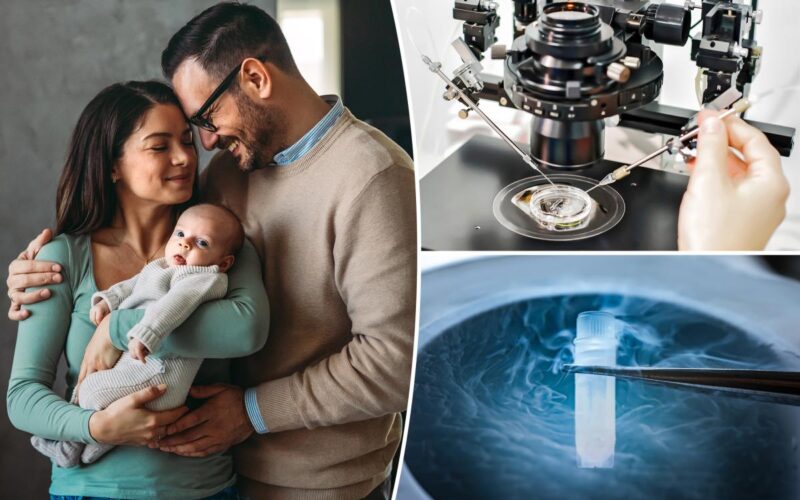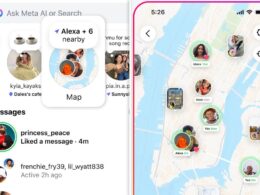Data, meet da-da.
A UK startup is shaking up the fertility world with an AI tool designed to predict a couple’s chances of IVF success.
Hopeful parents can walk away without paying a dime if treatment doesn’t result in a child — so far the algorithm has been right 90% of the time.
Gaia, which bills itself as the “first provider of value-based family building,” recently expanded to offer pricing guarantees to New Yorkers freezing their eggs.
“We flipped the model so families know exactly what they’re signing up for,” Nader AlSalim, Gaia’s co-founder and CEO, told The Post. “It’s about taking something that used to feel like a gamble and turning it into a plan.”
The former Goldman Sachs exec knows that struggle firsthand.
He launched Gaia following a $50,000 journey to parenthood. His wife underwent five rounds of IVF at clinics across several countries before their son finally arrived.
“Honestly, the bigger cost wasn’t just money, it was the uncertainty, the lack of transparency and the emotional toll of constantly wondering whether we’d get there,” AlSalim said. “It was incredibly frustrating and all too consuming.”
Those years, he said, were lonely and exhausting — a rollercoaster of hope and heartbreak in a medical system that often felt “cold and indifferent.”
“That experience made me realize: the system isn’t built for people, it’s built for procedures,” he said.
“The question becomes: how do we give people agency, clarity and dignity amidst such uncertainty? That’s the heart of the challenge — and the opportunity, in my opinion.”
Building families without breaking the bank
Founded in 2019, Gaia’s mission is simple: remove the financial barriers that keep so many would-be parents from trying IVF.
One of the biggest hurdles? The upfront cost. One round of IVF can run up to $30,000 in the US, with most couples needing several attempts before bringing home a baby.
Gaia flips the script. Before treatment begins, the company locks in a fixed total cost that considers extras that patients might need, like medication and multiple rounds of embryo transfers.
That’s significant, because if the first round fails, clinics can charge around $13,000 for another egg retrieval, and each additional embryo transfer can cost $5,000 or more, according to Gaia.
To start, clients pay a one-time “protection fee” — usually about 20% of the total treatment cost. They select a fertility clinic from a network of partners across the country, and then Gaia covers all of the upfront costs for up to three rounds of IVF.
If the treatment works, parents pay Gaia back over a period of up to eight years, with interest kicking in only after the baby is born. If IVF doesn’t result in a child after three cycles, clients don’t owe a cent.
“The real value is peace of mind,” AlSalim said. “It’s not a list of services; it’s akin to a membership to the most optimal path to having a child.”
Freeze without fear
Earlier this year, Gaia teamed up with Manhattan’s Extend Fertility to launch the first-ever egg freezing guarantee in the US — a move aimed at giving women in their 30s more control over their reproductive futures.
“The goal is to make sure egg freezing isn’t a luxury for those with $20,000 to spare, but an accessible choice for many more,” AlSalim said.
The process involves hormonal stimulation to ripen multiple eggs, followed by a surgical retrieval and storage at extremely low temperatures to preserve the unfertilized eggs for future use.
“Today, if you went through a cycle and let’s say you didn’t get eggs, you could be out tens of thousands of dollars,” he continued. “With Gaia and Extend, you don’t lose. You get to try again.”
Clients who don’t produce enough mature eggs during the first freezing cycle get a free second round or a refund. If the frozen eggs don’t lead to a live birth within five years, Gaia refunds the full cost of freezing.
If the process does result in a baby, clients can pay Gaia back anytime up to five years.
“This protection makes the decision to freeze younger, when it matters most, a little easier,” AlSalim said.
When AI meets IVF
So how can Gaia make those kinds of guarantees when so many families don’t succeed with IVF or egg freezing?
Simple: artificial intelligence.
“We use AI to forecast the weather and hedge the financial risk of natural disasters. Why can’t we predict something as simple as an ideal pathway to building a family?” AlSalim said.
Gaia’s software uses AI and machine learning to estimate how many IVF rounds a couple will likely need, analyzing personal biometrics alongside massive datasets from millions of past IVF cycles.
So far, the results speak for themselves: Gaia says its platform predicts IVF success with 90% accuracy and has already helped bring more than 100 babies into the world — with at least another 100 on the way.
“AI in fertility isn’t about abstraction; it’s about pattern recognition at a scale,” AlSalim said. “Done right, it can transform fertility care from a game of chance into a guided, informed journey.”
AlSalim often reflects on the mix of science, luck, money and sheer willpower it took to bring his son into the world.
“He is 6, he is wonderful, but I also realize how many people never get that chance,” the proud father said. “Not because of biology, but because of cost and uncertainty.”
While Gaia isn’t making fertility care cheaper — yet — AlSalim said the company is striving to make family building “fair, predictable and emotionally bearable.”
“We can’t wait for our next chapter; we’ll go further to make sure more parents get to experience what I’m lucky enough to experience every single day.”








